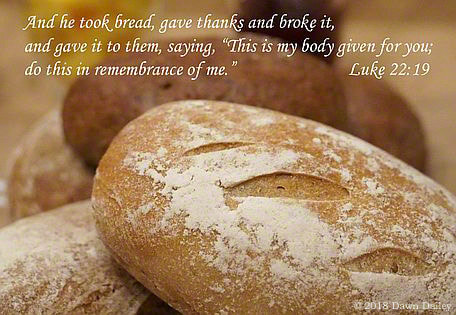In Part 1 of this series on bread, we see how bread is a symbol of our spiritual need and how Jesus satisfies our souls like nothing else can. In Part 2, we realize God is our provider and bread is symbolic of His provision.
Bread, so ubiquitous in cuisines around the world, is multi-faceted in its characteristics. Today we will explore how bread is both sacred and communal.
In our key verse today, Jesus is sharing bread with His disciples the night before He was crucified. Knowing He would soon be betrayed by one of His friends and that He would soon die on a cross, Jesus wanted one last meal with those who had walked with Him for the previous three years. When Jesus says “this is my body”, He transforms common bread into something sacred, something spiritual. The bread becomes a symbol of Christ’s physical death. Today, when we participate in the sacrament of Holy Communion, we enter into that sacredness as the bread symbolizes Christ’s body broken for us as He took the weight of our sins onto Himself. As we eat the bread, we share in His redemptive work on the cross. It’s a time to pause and reflect on the fact that Jesus paid the penalty for our sins so we can know God the Father. It’s a chance to celebrate Jesus’ resurrection and thank Him for His many provisions for us. Bread is sacred.
During the Last Supper, as they are leaning around the table, the disciples and Jesus enjoy communion with each other. The bread, broken and passed from one to another, bonds them together in a community of friendship, a bond of common purposes, and deepens their level of intimacy. In Bible times, it was considered reprehensible to share bread with someone and then do them harm. Judas betraying Jesus right after breaking bread with Him would have been shocking on many levels. Today, when we share food around the table, we partake in communion with those seated with us. In our culture, socialization happens frequently around the table as we meet over meals. Sharing food brings us together. Being at table with one another builds community. Eating together is an intimate process that creates deeper layers in a relationship. It intensifies our sense of community. Bread is indeed communal.
I experience this sacredness of bread every time I participate in the sacrament of Holy Communion at my local church. There is something so spiritual about a mere morsel of bread dipped in grape juice that signifies something so fantastic as Christ’s death and resurrection on the cross. His death wasn’t just for all humankind in a general sense. Every time we engage in Communion, our souls are imprinted with the overwhelming reality that Jesus died for me, for you. Personally. It is sacredness beyond words.
I experience the communal aspects of bread when I gather with friends over a meal. During a particularly difficult season of my life, I am thankful for friends who frequently invited me to a meal after the worship service at our church. Sharing a meal has created a sense of community, of belonging, and for me during that season, a sense of hope, healing, and restoration. Bread shared with one another is a powerful, communal, and relational force.
As Thanksgiving here in the US approaches, may we be intentional as we share food around the table, as we break bread with one another. May gathering around the dinner table deepen intimacy and a sense of community and belonging.
Lord Jesus, words fail to show the depth of my thankfulness for Your sacrifice. May bread be a frequent reminder to me of Your death and resurrection. Help me live in the power of Your risen Spirit. Use my time gathered around the table for deeper connections and a true sense of community. Amen.
Want to subscribe to future posts? Click here.
Text and photograph copyright © 2018 by Dawn Dailey. All rights reserved. Photo of delicious bread from a Parisian boulangerie.
All scripture quotations, unless otherwise indicated, are taken from the Holy Bible, New International Version®, NIV®. Copyright ©1973, 1978, 1984, 2011 by Biblica, Inc.™ Used by permission of Zondervan. All rights reserved worldwide. www.zondervan.com The “NIV” and “New International Version” are trademarks registered in the United States Patent and Trademark Office by Biblica, Inc.™

 RSS Feed
RSS Feed